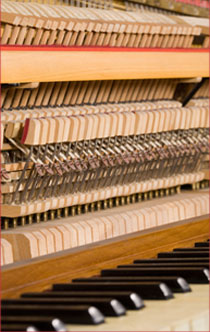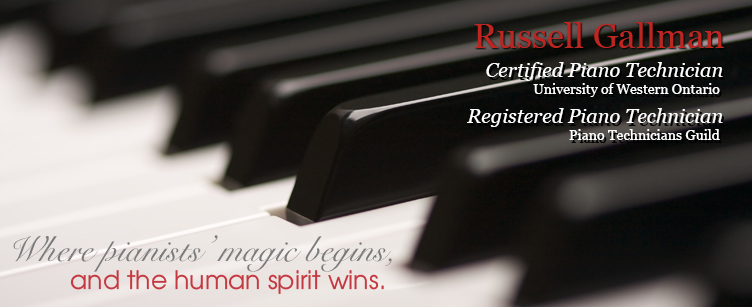Voicing
(770) 570-0356
contact@PrimePianoServices.com
Well Kept Secrets –
Regulation and Voicing are THE two well kept secrets of piano care. All piano owners know that their instruments will need to be tuned, but rarely have they been exposed to the importance and necessity of other aspects of piano maintenance.
Voicing –
What is voicing? Every piano has its own unique tonal characteristics. Many of those qualities are due to the engineering in the string scale and sound board design. However, it is your piano’s hammers that permit these integral designs to bloom. The hammers are one of the major components that give a piano its own distinctive voice. Voicing involves the manipulation of hammer felt and other mechanical components in order to build and optimize the tonal spectrum inherent in the piano.
There are two common processes used in the manufacture of piano hammers – hard pressed and soft pressed. In the soft pressed world, the hammer begins its life as soft material. Think of a cotton ball. Typically, the soft pressed hammers are too soft to produce the type of tone that most consumers prefer in their homes. So the manufacturer would infuse a chemical such as diluted lacquer into the felt fibers of the hammer in order to “build up” and stiffen the cloth and hence “build up the tone.” The opposite happens for the hard pressed hammers. They begin their useful life as densely layered, hard felt mallets. Consequently, this type of hammer must be softened and brought down for most ears. The most common form of voicing technique is “mechanical voicing.” The technician will use needles like sewing needles to “stab” and loosen the felt fibers. Other strategies include chemical softeners and steam. The end result is to produce a tone quality that the consumer prefers to hear.
Voicing types –
There are basically two modes of thought for voicing – concert voicing and residential voicing. In the concert world the pianos are voiced to have bite. The venues are often quite large and human bodies absorb sound. The pianos for the concert world need to be able to bring out the upper partials in the strings’ tonal spectrum. This permits the artist’s work to cut to the back of an acoustically challenged hall. It is not uncommon to have residentially voiced pianos brought to a concert auditorium as rental instruments. Residential tone is perceived as somewhat more rounded and mellow in comparison to the concert voiced piano. In a concert hall the residential voice can feel somewhat muted and will not have the same power to penetrate the space. Whether an artist prefers a tone that has a “felty mellowness” or “bright brassiness” is often a matter of personal taste. In some cases, voicing can be beneficial. Consult with your technician during a tuning visit regarding your options.
(770) 570-0356
contact@PrimePianoServices.com


